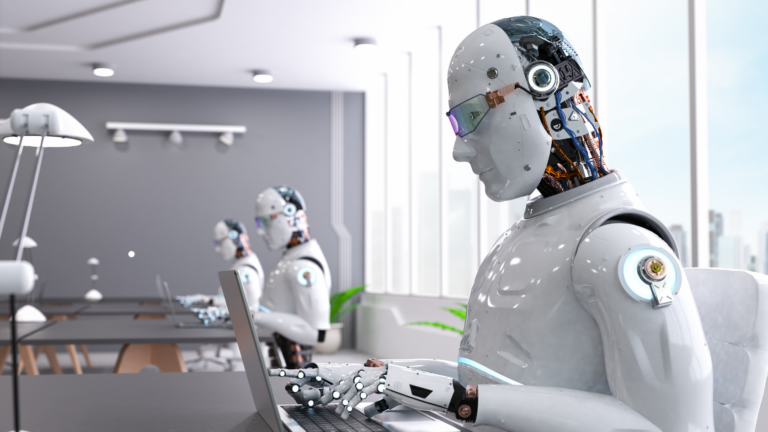- +1 (310) 504-3049
- info@thehiringadvisors.com
- 727 2nd Street, Ste 108 Hermosa Beach, CA 90254
- Mon – Fri 8AM – 5PM

ChatGPT. Google Bard. Microsoft Bing. The AI (artificial intelligence) race is in full swing, and the recruitment industry is not exempt. While much of the current conversation around AI and hiring practices paints a dystopian future of robots stealing people’s livelihoods, there is another facet to AI in recruitment that is often overlooked: the role AI tools currently play in recruiting workflows.
Whether AI will ultimately replace people’s jobs is uncertain, but what is already clear is that AI will have a role in giving people jobs — it already does. In this article, we’ll explore how AI is used in the hiring process, its positive and negative impacts, and how AI recruiting software could evolve in the future.
With a whopping 79% of organizations already using AI recruiting software, it is essential to understand how AI is being used in the hiring process now.
A commonly used recruiting tool is an applicant tracking system (ATS), which helps to screen applicants using keywords and track the applicants’ progress through the hiring process. An ATS can help hiring teams save time, reviewing thousands of resumes, creating job listings, and creating searchable candidate databases with little human input.
A less common but equally useful AI recruiting software is a candidate relationship management system (CRM), which — despite clear benefits —is only used by less than 50% of Fortune 500 companies. The idea behind a CRM is building relationships with potential candidates, whereas an ATS only has access to candidates who have applied to the job listing. CRMs gather data on sought-after talent from sources such as LinkedIn, job boards, and company career sites. In addition to supporting proactive recruiting, a CRM can schedule interviews, segment potential candidates for email marketing campaigns, and manage data.

AI has the potential to make the hiring process easier for both candidates and businesses, speeding up the process, automating administrative tasks, and even improving brand reputation.
Firstly, AI has the potential to speed things up when it comes to recruitment. It currently takes, on average, 60 days to fill a role, meaning internal teams are often left covering workloads for months before a suitable new candidate is appointed.
Timelines are dragged when hiring managers and recruiters are bogged down with administrative tasks, data processing, resume reviews, and interview coordination. With a hot labor market, taking too long to get back to candidates or make offers can mean losing out on top talent. With AI automation, hiring teams can streamline the process, freeing up valuable time to focus on finding the right talent.
Collecting candidate information, processing data, and building dashboards are vital for an effective hiring process so companies can develop better hiring funnels. Data-driven approaches to attract better-qualified talent are proven to not only find stellar new team members more easily but also cut down hiring time, saving money and resources.
Unfortunately, human error can easily affect data quality, giving hiring teams incorrect insights into the candidate pool and employment methods. AI hiring software such as ATSs and CRMs can help process massive amounts of applicant data accurately, where human processing power falls short.

Understandably, human resources and hiring teams are not experts in every role at their company. If an HR employee needs to fill the role of a specialized data scientist, for example, the HR representative may not fully understand what qualifications to look for in a suitable candidate.
Many AI databases have search capabilities, allowing hiring teams to make complex queries. With qualification guidelines from a subject matter expert, HR can easily search for those qualifications and bring in more relevant talent.
While your company is interviewing prospective team members, job seekers are also interviewing your company. How candidates are treated during the hiring process significantly impacts their decision to take a role. A study from Talentegy found that 54% of applicants said a negative hiring process would influence their decision to take a position, with another 64% expressing that a negative experience would stop them from reapplying to the company entirely.
This study found that part of the negative hiring process was communication. A shocking 63% of candidates were dissatisfied with how companies communicated with them during the hiring experience, while another 75% said they never received any feedback after they applied.
Not only can AI tools give HR teams more interaction time with candidates, but AI recruiting software can even manage communication by sending automated messages, developing candidate-specific responses, and scheduling interviews.

AI tools are not without their drawbacks, however, and when used indiscriminately, hiring teams will likely encounter challenges. The downsides of AI in hiring include missing qualified talent, lacking human judgment, and new regulations.
While advocates of AI in recruiting believe these technological advances can eliminate human discrimination, there are many real-world examples to the contrary. Amazon’s now abandoned AI recruiting tool displayed overt sexism, explicitly downgrading candidates whose resumes included the word ‘women’ and rejecting candidates based on their attendance at an all-women’s college. In another instance, iTutor, an English-language tutoring service for students in China, had to pay a $356,000 lawsuit for using their AI recruitment tools to automatically reject candidates 55 years of age or older.
In response to bias in AI hiring, new laws regulating AI hiring processes are popping up in the US. Over the summer, New York passed a law requiring companies to disclose if they use AI for hiring, provide candidates data upon request, and submit annual audits proving a lack of bias. New York’s bill inspired similar legislation in New Jersey and Maryland. California’s proposed AI bill is considering the legal liability for employers who fail to prevent bias and developing security measures to ensure foreign governments cannot access California AI technology.
As more states eventually adopt AI hiring regulations, it will likely be more challenging to attract qualified candidates wary of AI recruiting and increase recruitment costs to ensure companies are complying with local laws.
Despite the wide use of AI software in hiring, Pew Research found that 41% of Americans do not like that AI is used to screen applicants. The study also found that 66% of Americans would not apply at all if they knew that AI is used for hiring decisions. While not all organizations have to disclose if they are using AI, this may change with the introduction of regulatory changes.

While a major plus to AI recruiting software is the ability to sift through thousands of submissions, the reality is that the tool’s parameters can easily disqualify or overlook exceptional candidates. Many companies have different names for similar positions or use different acronyms. Creative professionals, such as social media managers, may use more colorful language to describe their work experience that AI cannot equate to the keywords it searches for.
Whether or not a candidate fits into the company culture can significantly influence employee retention. AI does not have the ability to assess if a new hire will click with the current team — at least right now. It takes a human to gauge a candidate’s personality, quirks, and energy.
Similar to assessing cultural fit, soft skills cannot be gauged by a computer. AI cannot analyze decision-making skills, judgment, tone, or how a professional carries themselves. Emotional intelligence and people skills are vital for client-facing positions and leadership roles.

AI recruiting has the potential to expedite hiring operations, give recruiters more face-to-face time with candidates, and improve the overall applicant experience. While AI hiring software is still in its infancy, oversight from experienced hiring teams is paramount to ensure AI continues to serve the betterment of the hiring process.
As AI technology rapidly evolves, so too will the landscape of hiring. One day, AI could conduct voice and behavior analysis to measure emotional intelligence, offer applicant growth recommendations for job seekers, or even monitor candidate engagement and feedback, giving recruits and hiring managers data to better the hiring experience.
Nonetheless, it’s critical to remember that AI recruiting software is only as good as the hiring team using it. Seasoned, trained experts who understand the intricacies of the hiring process and how candidates think are crucial to making the most of AI hiring tools.
To discover how your team can effectively use AI recruiting software to place your next hire, book a free consultation with one of our recruiters.
Engaging, specific and targeted search results –we are the Local LA based Recruiting agency helping clients and candidates to find their perfect match.
Sign up to our newsletter and stay up to date on the latest insights.
© 2022 ATeams Inc., All rights reserved. Terms of Service | Privacy Policy